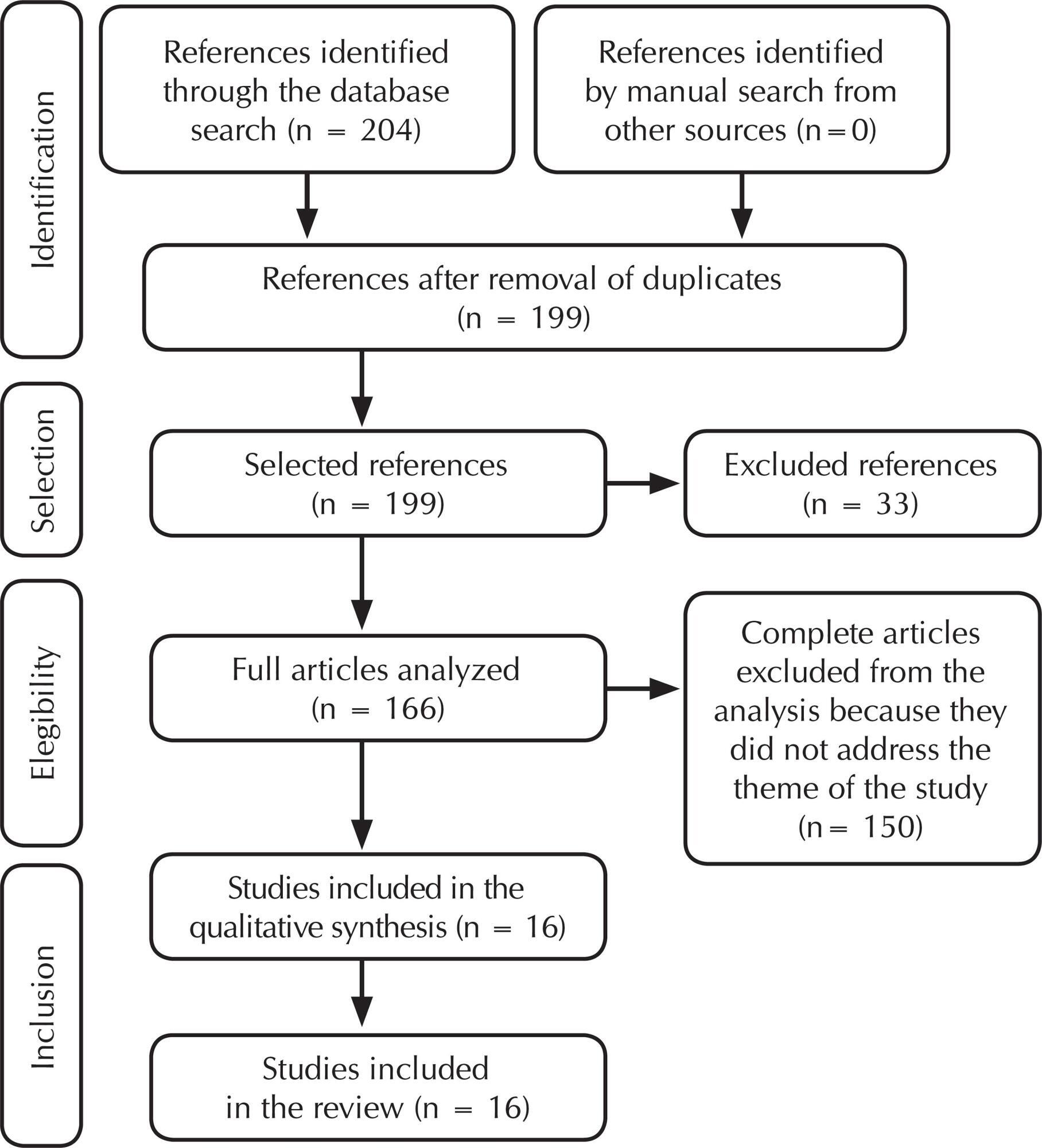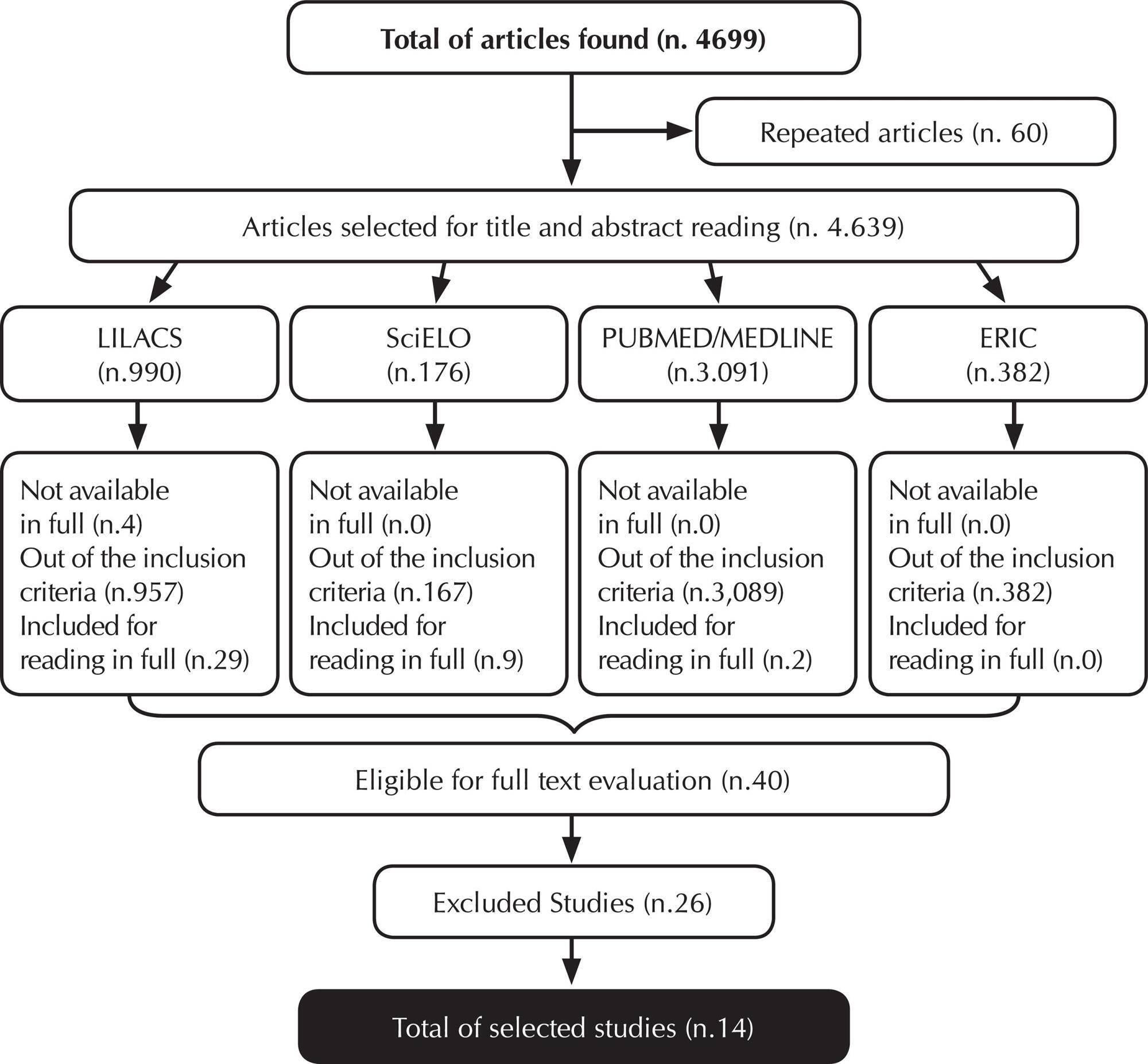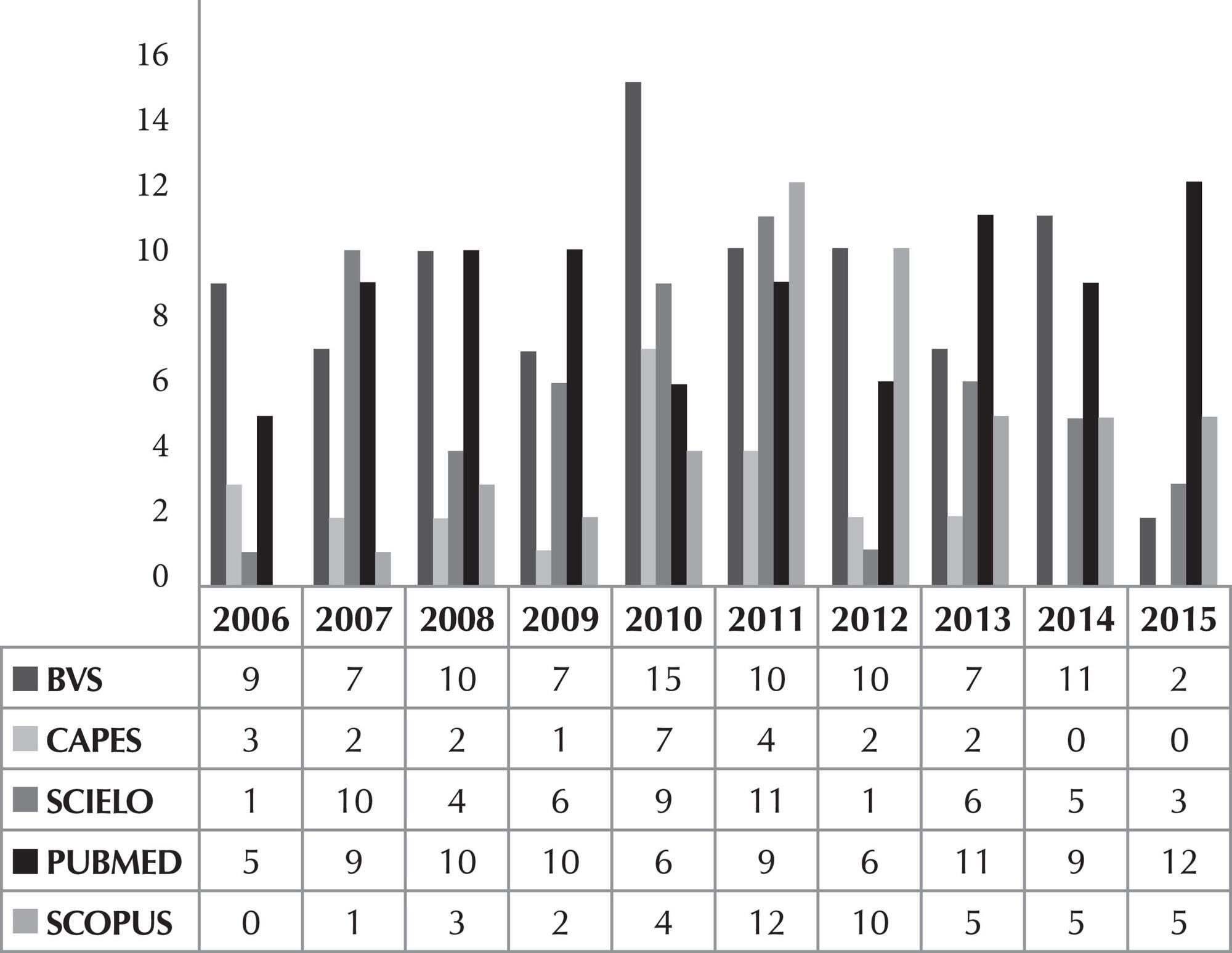-
EXPERIENCE REPORT01-01-2018
Death education: sensibility for caregiving
Revista Brasileira de Enfermagem. 2018;71:1779-1784
Abstract
EXPERIENCE REPORTDeath education: sensibility for caregiving
Revista Brasileira de Enfermagem. 2018;71:1779-1784
DOI 10.1590/0034-7167-2017-0018
Views0See moreABSTRACT
Objective:
to report the application of a participatory teaching-learning method on the themes death, dying, and associate care to highlight its applicability to the students.
Method:
report of application of participatory method in 22 students from the 6th period of the undergraduate program in Nursing and Obstetrics of a public university. The first stage focused on personal experiences of the students and the second on professional prospects. As resources for data collection we used music, drawing, drama, and photography.
Results:
after applying the method, the students assigned meanings to death and nursing care, reflected, criticized, and resignified experiences on the theme.
Conclusion:
the method was considered applicable and effective to achieve the objective, that is, it enables learners to act as protagonists of the teaching-learning process, building together a new perspective of end-of-life care.
-
EXPERIENCE REPORT01-01-2018
Community intervention in the Nursing education: experience report
Revista Brasileira de Enfermagem. 2018;71:1774-1778
Abstract
EXPERIENCE REPORTCommunity intervention in the Nursing education: experience report
Revista Brasileira de Enfermagem. 2018;71:1774-1778
DOI 10.1590/0034-7167-2017-0351
Views0See moreABSTRACT
Objective:
To report the implementation and results of community intervention projects used as a strategy for teaching and developing people and communities in the training of community health nursing specialists at the Centro de Formação de Saúde Multiperfil (Multi-profile Health Training Center), Angola.
Method:
Report of experience of the use of community intervention projects in nursing.
Results:
Community intervention projects have contributed to the learning of students and to the promotion of health, citizenship and the empowerment of individuals and communities. Its implementation is in the fourth year, and 16 projects have already been developed in 2 distinct neighborhoods, and this year the intervention will cover a third.
Conclusions:
Nursing teaching should adopt strategies that lead the student not only in the path of professional autonomy, but, above all, in the empowerment of people and communities. Community intervention is undoubtedly important in this area.
-
EXPERIENCE REPORT01-01-2018
The Pororoca effect on permanent education in health: about the interaction research-work
Revista Brasileira de Enfermagem. 2018;71:1768-1773
Abstract
EXPERIENCE REPORTThe Pororoca effect on permanent education in health: about the interaction research-work
Revista Brasileira de Enfermagem. 2018;71:1768-1773
DOI 10.1590/0034-7167-2017-0462
Views0See moreABSTRACT
Objective:
to build municipal responsibility with the permanent education in health policy from the interaction between research and innovation of work practices.
Method:
experience reports structured through dialogic meetings that allowed the participative diagnosis and strategic administration considering research in health education.
Results:
from the activities and interactions, we identified active forces in the reinvention of training for workers in the municipal network of health services, in which we found three streams: “inside and outside interactions”, “movement towards meetings” and “strategic collective arrangements”.
Final considerations:
through action research and a collaborative critique, collective movements were constructed, they showed ways to produce new directions in health education and allowed the strategic creation of the Núcleo de Educação Permanente as a responsibility of the municipal government, not depending on Federal policies.
-
REVIEW01-01-2018
Educational technologies and practices for prevention of vertical HIV transmission
Revista Brasileira de Enfermagem. 2018;71:1759-1767
Abstract
REVIEWEducational technologies and practices for prevention of vertical HIV transmission
Revista Brasileira de Enfermagem. 2018;71:1759-1767
DOI 10.1590/0034-7167-2016-0333
Views0See moreABSTRACT
Objective:
to assess available evidence on educational technologies and practices for prevention of vertical HIV transmission.
Method:
LILACS, PubMed, Scopus, BDENF, between April and May 2016, with the descriptors: “Vertical Transmission of Infectious Disease”, “HIV”, “Health Education” and “Technology”.
Results:
there are 16 articles published between 2000 and 2014, mostly Brazilian and African, Cross-sectional and with low level of evidence. The studies covered the use of hard technologies, through video, radio and telephone, and soft, emphasizing, in particular, counseling.
Conclusion:
the studies recognize the importance of educational activities as a tool for health promotion in the context of vertical HIV transmission, despite reporting the need for constant training of professionals and urgency in the renewal of educational concepts and practices. Therefore, it is recommended to expand and consolidate health counseling and emphasize the role of nurses as an important actor in this setting.

-
REVIEW01-01-2018
Liberating critical pedagogy of Paulo Freire in the scientific production of Nursing 1990-2017
Revista Brasileira de Enfermagem. 2018;71:1751-1758
Abstract
REVIEWLiberating critical pedagogy of Paulo Freire in the scientific production of Nursing 1990-2017
Revista Brasileira de Enfermagem. 2018;71:1751-1758
DOI 10.1590/0034-7167-2017-0699
Views0See moreABSTRACT
Objective:
To analyze the theoretical and methodological application of Paulo Freire’s critical pedagogy in the scientific production of nursing.
Method:
An integrative review was carried out with consultation of the databases: LILACS, BDENF, MEDLINE, PUDMED and CINHAL. We included studies in the Spanish, English and Portuguese languages, published from 1990 to 2017.
Results:
A total of 38 articles were analyzed, of which the main concepts adopted were: dialogue/dialogicity, awareness/critical awareness and questioning. Regarding the application of the method, it was noticed the predominance of the adoption of elements such as culture circles, thematic phase and horizontality relation of the nurse with the individuals involved.
Conclusion:
Nursing has partially appropriated the Freire’s referential. However, it reveals the intentionality of a transformative practice that requires deepening for the implementation of the method in its full.

-
REVIEW01-01-2018
Supervised internship in undergraduate education in nursing: integrative review
Revista Brasileira de Enfermagem. 2018;71:1740-1750
Abstract
REVIEWSupervised internship in undergraduate education in nursing: integrative review
Revista Brasileira de Enfermagem. 2018;71:1740-1750
DOI 10.1590/0034-7167-2017-0340
Views0See moreABSTRACT
Objective:
to analyze the evidence available in the literature on the contributions of the Supervised Internship in nursing training in Brazil and the teaching-learning methods employed.
Method:
integrative review of the literature, with search of articles published between 2002 and 2016, in PubMed, LILACS, SciELO and Eric databases.
Results:
Of the 4,699 articles consulted, 14 met the inclusion criteria. The analysis of these studies revealed three thematic categories: the understanding about the role of Supervised Internship; the teaching-learning processes employed; and their contributions to the training of nurses.
Final considerations:
this is a fundamental element in the academic training, since, depending on the didactic-pedagogical organization, it makes possible the (re) signification of the acquired knowledge throughout the course and realizes the professional competences. The teaching-learning methods are structured by the critical pedagogy, being the active methodologies the main choices of the authors.

-
REVIEW01-01-2018
Nursing higher education in MERCOSUR: a bibliometric study
Revista Brasileira de Enfermagem. 2018;71:1732-1739
Abstract
REVIEWNursing higher education in MERCOSUR: a bibliometric study
Revista Brasileira de Enfermagem. 2018;71:1732-1739
DOI 10.1590/0034-7167-2017-0405
Views0See moreABSTRACT
Objective:
to identify productions that approach nursing high education in member states of MERCOSUR.
Method:
bibliometric study with quantitative approach carried out in search mechanisms, such as BVS, Capes, SciELO, Scopus and PubMed, between 2006 and 2015. It was found 301 articles about nursing education in MERCOSUR.
Results:
point to concern for the nurse’s education for public health policies, for teacher’s education and the teaching-learning process. However, publications regarding technologies associated with distance education on health field are low.
Conclusion:
this study contributes with discussion in nursing education field when points to the themes regarding the production about nurses’ education in MERCOSUR, specially, the range of targets set up in the Educational MERCOSUR agreement.

-
REVIEW01-01-2018
Educational technologies for health education on stroke: an integrative review
Revista Brasileira de Enfermagem. 2018;71:1724-1731
Abstract
REVIEWEducational technologies for health education on stroke: an integrative review
Revista Brasileira de Enfermagem. 2018;71:1724-1731
DOI 10.1590/0034-7167-2017-0041
Views0See moreABSTRACT
Objective:
to identify in the scientific literature the educational technologies used in the health education process related to stroke.
Method:
integrative review, whose eligibility criteria of the articles were: match the keywords “health education” and “stroke”; be a research paper; be in Portuguese, English and Spanish; be available electronically in the databases LILACS, PubMed/Medline, Scopus and CINAHL; year of publication between 2000 and 2016.
Results:
24 publications were found. The analysis was carried out by means of analytical and interpretive readings. There were many educational technologies used in the health education process for stroke.
Final considerations:
the printed material for general public stood out, aiming to the recognition of alert signs of the disease and the emergency decision-making before suspicious cases of the disease.
Search
Search in:
Nuvem de Tags
Adolescente (85) Atenção Primária à Saúde (239) COVID-19 (91) Criança (91) Cuidados de Enfermagem (269) Educação em Enfermagem (151) Educação em Saúde (139) Enfermagem (930) Enfermagem Pediátrica (86) Estudantes de Enfermagem (77) Estudos de Validação (131) Família (87) Idoso (208) Promoção da Saúde (99) Qualidade de Vida (104) Saúde do Trabalhador (86) Saúde Mental (145) Saúde Pública (82) Segurança do Paciente (150) Tecnologia Educacional (100)



